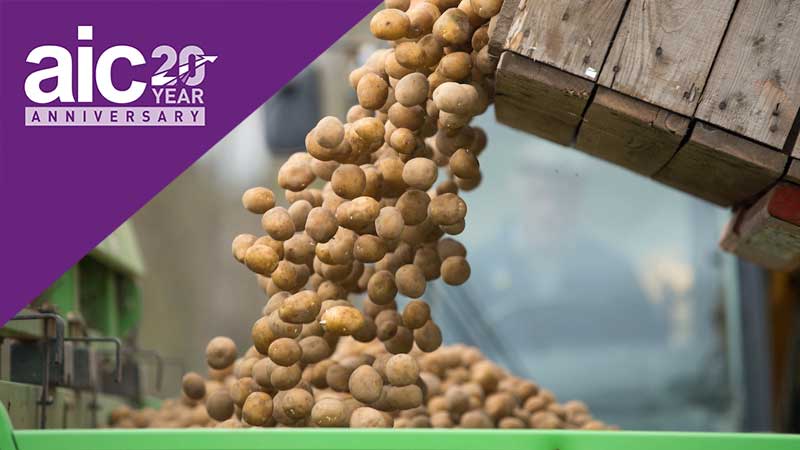AIC at 20: Pushing back on restrictions for Maleic Hydrazide treated potatoes in livestock feed

As AIC marks 20 years as the UK agri-supply industry’s leading trade association, we're looking back at some of its greatest achievements since it was founded in 2003.
Each week throughout 2023, we’ll explore a major achievement where AIC represented its Member businesses, promoted the benefits of modern commercial agriculture in the UK, and supported collaboration throughout the food chain.
Find out how AIC helped convince the Government to reconsider a proposed restriction for feeding potatoes that are treated with a popular growth regulator to livestock.
Valuable feed ingredient
Maleic Hydrazide (MH) is a commonly used plant growth regulator for potato crops which is applied as a foliar spray and used to control the growth of stored potatoes as well as any left behind in the field that might otherwise become volunteers.
When a dossier for MH was submitted to renew its approval in the European Union, there was insufficient data for the European Food Safety Authority (EFSA) to complete a risk assessment on the safety of feeding treated potato products to livestock.
Potatoes deemed unfit for human consumption represent a valuable high-energy and nutrient-rich ingredient for animal feed, with their use also helping to dramatically reduce food waste.
As a result of the decision at a European level, the Chemicals Regulation Division (CRD) in the UK proposed that any MH products sold from 1 November 2018 should carry a label stating that treated crops should not be fed to livestock until approval holders had undertaken trials to generate the data required, proving its safety.
Doing the research
Representing its Members in the Feed and Crop Protection sectors, AIC was uniquely placed to address this issue and provided data to a UK impact assessment.
This showed up to 1 million tonnes of potato products could potentially be lost to landfill, at a value of nearly £56 million each year.
The data also highlighted that the UK feed industry would need to find replacement feed materials to make up this nutrient shortfall calculated at an additional cost of £8 million per annum.
Working closely with its UK Former Foodstuffs Processors Association (UKFFPA) affiliates, AIC shared an economic impact assessment and infographic showing the diversity of entry points for potato products entering the animal feed manufacturing supply chain with officials at the CRD and the Department for Environment, Food and Rural Affairs (Defra) to make a compelling case against the proposed restrictions.
Restriction rejected
AIC lobbied ministers and officials at Defra and the CRD to delay implementing this restriction until the necessary studies to fill the data gaps had been reviewed by the EFSA.
In 2019 the CRD concluded that, based on fresh data, it would not restrict the feeding of MH-treated potatoes to livestock, meaning they could continue to be used as a valuable ingredient by animal feed manufacturers.
Find out more about the animal feed sector by watching the video below.
Make sure you're following AIC on X and LinkedIn for regular updates.
Visit the AIC at 20 webpage for more content like this.




